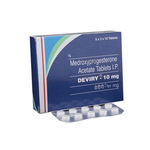Medace 10mg Tablet
Medace 10mg Tablet is used for contraception, treatment of abnormal uterine bleeding, managing endometriosis, and as a component of hormone replacement therapy.
Medroxyprogesterone acetate belongs to the class of medications known as progestins, synthetic forms of the hormone progesterone.
If used as contraception or hormone replacement therapy, follow the prescribed schedule strictly. Take MPA at the same time each day to maintain consistent levels in the body.
It's crucial to follow the prescribed dosage and guidance from a healthcare professional while using Medroxyprogesterone acetate (MPA). If you encounter any adverse effects or have concerns during its use, consult your healthcare provider for assistance.
Similar Medicines
Related Posts

1:15
When does the period come after taking Unwanted 72 / I-pill?

1:15
Birth control pill: Does it decrease your fertility?

1:15
Are Your Hormones Out Of Balance? Signs & Symptoms!

1:15
How Do You Know If You Have a Vaginal Infection? Warning Signs!

1:15
Top Health Benefits of Cinnamon | How to Use It for Better Health!

1:15
Is Your Blood Pressure Too Low? What Are the Best Remedies to Fix Low Blood Pressure Instantly?

1:15
Mala D: How it works, When and How to take Mala D and Side Effects of Mala D!
Disclaimer : This information is not a substitute for medical advice. Consult your healthcare provider before making any changes to your treatment . Do not ignore or delay professional medical advice based on anything you have seen or read on Medwiki.
Medace 10mg Tablet
Prescription Required
Packaging :
strip of 10 tablets
Manufacturer :
Rowez Life Sciences Pvt. Ltd.Composition :
Medroxyprogesterone acetate (10mg)




















.svg)
